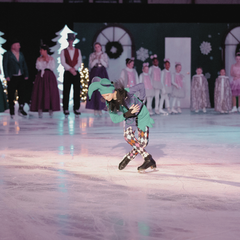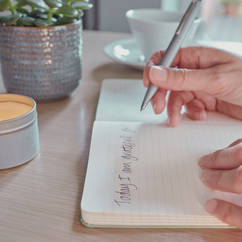 The Jester Doll takes a bow during the Nutcracker on Ice The Jester Doll takes a bow during the Nutcracker on Ice It’s easy to get down on ourselves in this sport because it’s so freaking difficult. There are so many ways a skill can go wrong - spins travel, turns scrape, jumps don’t go up, your feet don’t lean the right way or move quickly enough or move too quickly, the free leg bends, the arms get lost, the head wants to take the lead on takeoff, and your bum can hit the ground at any time. Even if we love the day-to-day grind and working ourselves to the bone–and you have to if you want to make any real progress– there will still be hard moments, weeks, months, and seasons. There will be times when we trip over our toe picks, fall on our kneecaps, can’t remember the steps, kick ourselves in the shin, slip off the heel, split a chin, have an asthma attack, develop tendonitis, collide with another skater, and maybe even break a bone or get a concussion. We get a goal in mind to motivate ourselves, and we know that progress is not a straight line, but when the bummers pile up, and it starts to seem that everyone else is having better days and making more progress than you... how do you keep going? For some adult skaters maybe it’s a little easier than for adolescents–for many adults, skating is their happy place outside of work and family stressors. But for teen and tween skaters who don’t yet have the gift of years to teach them perspective, it’s easy to look at someone else’s journey and feel dejected. Since 2020 one difficult situation after another has come my way. Some have been life-and-death situations, others financial, others mental and emotional, and others have simply been life-changing. And what I’ve come to really see from all of this is that there is a lot of suffering in the world. Everyone on this planet is dealing with something–some way more than others–and none of our blessings are guaranteed. Not a single one. At the time of writing this, I have not been on the ice or able to do a an asana based yoga practice in over 8 weeks due to a hip injury. I will soon have surgery, which will potentially mean another 5 months off. It is well-documented that exercise is a key component of physical and mental health. For many of us, skating is the main form of exercise to help us manage life’s daily stressors and keep our brains happy. For me, yoga is even more important for my mental health than skating. So, when we can’t skate or practice asana (the physical postures), or when we find ourselves feeling down and dejected about skating (or anything), what can we do to help? For me, the answer has been to practice gratitude. That may sound silly, because why be grateful when things have plummeted downhill? I certainly don't mean to deny your feelings in a “good vibes only” sort of way. Recognizing, acknowledging, and releasing emotions is key to our health. However, I also believe we can and should always find something to be grateful for. Since I have not been able to practice asana for what feels like a very long time, and I make efforts not to dwell on the negative, I have made gratitude a key component of my daily routine. (It’s all about where we direct our energy (brahmacharya). So, even though my hip pain is pretty constant, in some ways I feel better than I have in years. With gratitude, optimism is sustainable. How Gratitude Fits Into the Figure Skater MindsetDifferent traditions of yoga have different frameworks for guiding yogis on their path. One of the most commonly used frameworks today comes from the Yoga Sutras written by the sage Patanjali, somewhere between the second and fourth centuries BCE. Patanjali’s framework is known as the 8 limbs of yoga. Each of the 8 limbs represents an area of practice that ancient sages found essential to the yogic journey - the spiritual path, or the path to a calm mind and a happy, purposeful life. The second limb, the niyamas, is comprised of 5 internal observances or habits. In skating terms, the niyamas have to do with practicing self-discipline and developing good habits–specifically habits that relate to mindset. What do we learn from this? That even thousands of years ago wise people knew about the need to practice developing the right mindset. Under the umbrella of the niyamas is santosha (contentment), which we can cultivate by practicing gratitude. Study after study shows that regular gratitude practice actually changes your brain. For skaters who regularly practice gratitude, some of the many benefits are:
Overall, a skater who practices gratitude is a more resilient and happier skater. Who doesn’t want these results? Ways for Figure Skaters to Practice Gratitude to Improve Mindset A figure skater practices gratitude by journaling A figure skater practices gratitude by journaling As with anything in life, not even a gratitude practice can help if you’re just going through the motions or if you do the opposite and turn the practice into an obsession, or become fearful if you forget to practice one day. The yamas and niyamas account for this…. The third niyama is tapas, which means desire–we must balance contentment with desire and drive so it doesn’t turn into complacency. The first yama is ahimsa (non-harm) and the second is satya (honesty), so any practice must be built on the foundation of not causing harm in thought, word, or action and of being honest with oneself and with others. (You shouldn't stay with someone who is abusive because you feel indebted to them, for example.) Skaters who incorporate a gratitude practice into their daily routine and mental “training” will find immeasurable benefits. Here are 7 Simple Ways Skaters Can Add a Gratitude Practice to Their Mental Training:
Make Gratitude a Part of Your Figure Skating TrainingJust like developing a skill in skating, the key to practicing gratitude and developing contentment (santosha) is consistency. Day in and day out - just keep showing up intentionally and mindfully for the work. And the key to consistency is to start with small, achievable tasks. Choose 1-2 exercises from above that seem most doable for you. Think of how you can best implement them and how to remove any barriers that might keep you from practicing. Want to begin bowing at the end of your lessons? Tell your coaches. Maybe you already do that, so maybe you incorporate a deep breath and a silent mantra as you do it, to mix it up and make it more meaningful to you. If you choose to journal once a week, maybe you make on your calendar. Gratitude jar? Place it on your desk where you see it often. Decorate it so it’s more attractive and meaningful to you. Then, every so often, take time to reflect on your gratitude practice and notice what changes you have seen in yourself. The practice of yoga is all about balance and unity - santosha must be balanced with tapas, or it becomes complacency with our current state, and both must begin from a foundation of the 5 yamas: non-harm (ahimsa), honesty (satya), non-attachment (asteya), right use of energy (brahmacharya), and non-covetousness or ungreediness (aparigraha, which is another way of looking at gratitude).
Let us be grateful for what we have and where we are–none of it is ever guaranteed–but also keep working towards our purpose because it’s the right thing to do and because we have the desire to learn and keep progressing, regardless of the outcome. Figure skating is a very difficult and competitive sport with lots of challenges and potential injuries. Skaters should incorporate a regular gratitude practice as part of their daily routine and training to improve mindset, cultivate joy, train smarter, and truly enjoy the learning process and skating experience. The process is where the growth happens--it’s where we live. The process, or the practice, is the path. Get more tips to replace harmful training habits on the ice with helpful ones with my FREE GUIDE: Anti-Anxiety Tools for Skaters.
0 Comments
Leave a Reply. |
Author // the skating yogiMy name is Sarah Neal. I have been immersed in the world of figure skating for over four decades. I have seen firsthand the abuse that happens at the higher levels of our sport and experienced how that trickles down into unhealthy training practices and habits at the grassroots. I have seen this play out in the operations of the very institutions that control our sport. Whether for a profession or hobby, pursuing skating should be a joyful, rewarding process, an opportunity for athletic and personal growth, and a place to build lasting friendships. Archives
March 2024
CategoriesAll Athlete Well Being Athlete Well-Being Deep Connections Embodied Movement And Meditation Practices Life After Competition Mindful Living |
Search by typing & pressing enter


 RSS Feed
RSS Feed